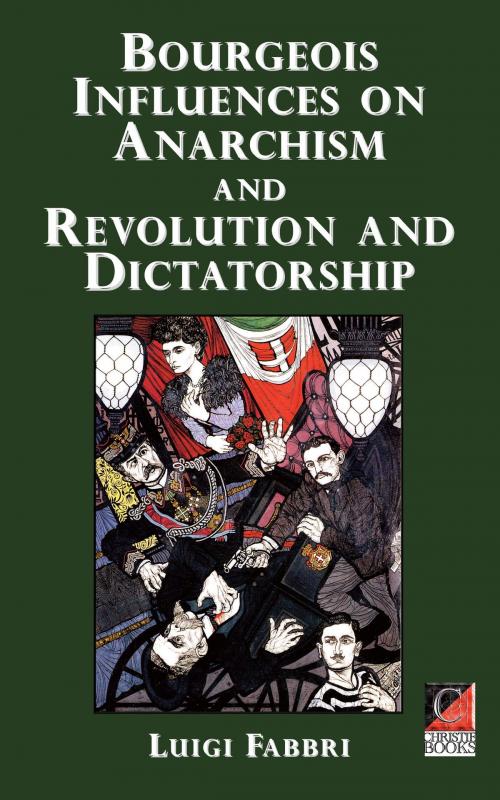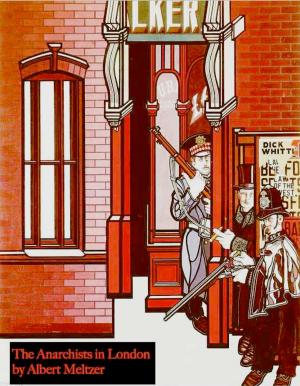Bourgeois Influences on Anarchism and Revolution and Dictatorship
Nonfiction, History, Revolutionary, Social & Cultural Studies, Political Science, Government, Communism & Socialism, Politics, History & Theory| Author: | Luigi Fabbri | ISBN: | 1230001459111 |
| Publisher: | ChristieBooks | Publication: | December 7, 2016 |
| Imprint: | ChristieBooks | Language: | English |
| Author: | Luigi Fabbri |
| ISBN: | 1230001459111 |
| Publisher: | ChristieBooks |
| Publication: | December 7, 2016 |
| Imprint: | ChristieBooks |
| Language: | English |
Bourgeois Influences on Anarchism was written in 1914 by Italian anarchist communist Luigi Fabbri (1877-1935), around the time the opening shots of WWI were being fired. In it he addresses problems he sees as resulting from the stereotyping of anarchism both in bourgeois literature and the media, and the negative effect this was having on popular culture, and on the actual anarchist movement.
“The minds of men, especially of the young, thirsting for the mysterious and extraordinary, allow themselves to be easily dragged by the passion for the new toward that which, when coolly examined in the calm which follows initial enthusiasm, is absolutely and definitively repudiated. This fever for new things, this audacious spirit, this zeal for the extraordinary has brought to the anarchist ranks the most exaggeratedly impressionable types, and at the same time, the most empty headed and frivolous types, persons who are not repelled by the absurd, but who, on the contrary, engage in it. They are attracted to projects and ideas precisely because they are absurd, and so anarchism comes to be known precisely for the illogical character and ridiculousness which ignorance and bourgeois calumny have attributed to anarchist doctrines.”
The minds of men, especially of the young, thirsting for the mysterious and extraordinary, allow themselves to be easily dragged by the passion for the new toward that which, when coolly examined in the calm which follows initial enthusiasm, is absolutely and definitively repudiated. This fever for new things, this audacious spirit, this zeal for the extraordinary has brought to the anarchist ranks the most exaggeratedly impressionable types, and at the same time, the most empty headed and frivolous types, persons who are not repelled by the absurd, but who, on the contrary, engage in it. They are attracted to projects and ideas precisely because they are absurd, and so anarchism comes to be known precisely for the illogical character and ridiculousness which ignorance and bourgeois calumny have attributed to anarchist doctrines.
The first English translation of Fabbri’s classic dissection of problems which still plague anarchism today, such as the identification of anarchism in the capitalist press with disorganization, chaos, and terrorism, and the consequent embracement of such things by some “anarchists.”
Bourgeois Influences on Anarchism was written in 1914 by Italian anarchist communist Luigi Fabbri (1877-1935), around the time the opening shots of WWI were being fired. In it he addresses problems he sees as resulting from the stereotyping of anarchism both in bourgeois literature and the media, and the negative effect this was having on popular culture, and on the actual anarchist movement.
“The minds of men, especially of the young, thirsting for the mysterious and extraordinary, allow themselves to be easily dragged by the passion for the new toward that which, when coolly examined in the calm which follows initial enthusiasm, is absolutely and definitively repudiated. This fever for new things, this audacious spirit, this zeal for the extraordinary has brought to the anarchist ranks the most exaggeratedly impressionable types, and at the same time, the most empty headed and frivolous types, persons who are not repelled by the absurd, but who, on the contrary, engage in it. They are attracted to projects and ideas precisely because they are absurd, and so anarchism comes to be known precisely for the illogical character and ridiculousness which ignorance and bourgeois calumny have attributed to anarchist doctrines.”
The minds of men, especially of the young, thirsting for the mysterious and extraordinary, allow themselves to be easily dragged by the passion for the new toward that which, when coolly examined in the calm which follows initial enthusiasm, is absolutely and definitively repudiated. This fever for new things, this audacious spirit, this zeal for the extraordinary has brought to the anarchist ranks the most exaggeratedly impressionable types, and at the same time, the most empty headed and frivolous types, persons who are not repelled by the absurd, but who, on the contrary, engage in it. They are attracted to projects and ideas precisely because they are absurd, and so anarchism comes to be known precisely for the illogical character and ridiculousness which ignorance and bourgeois calumny have attributed to anarchist doctrines.
The first English translation of Fabbri’s classic dissection of problems which still plague anarchism today, such as the identification of anarchism in the capitalist press with disorganization, chaos, and terrorism, and the consequent embracement of such things by some “anarchists.”















